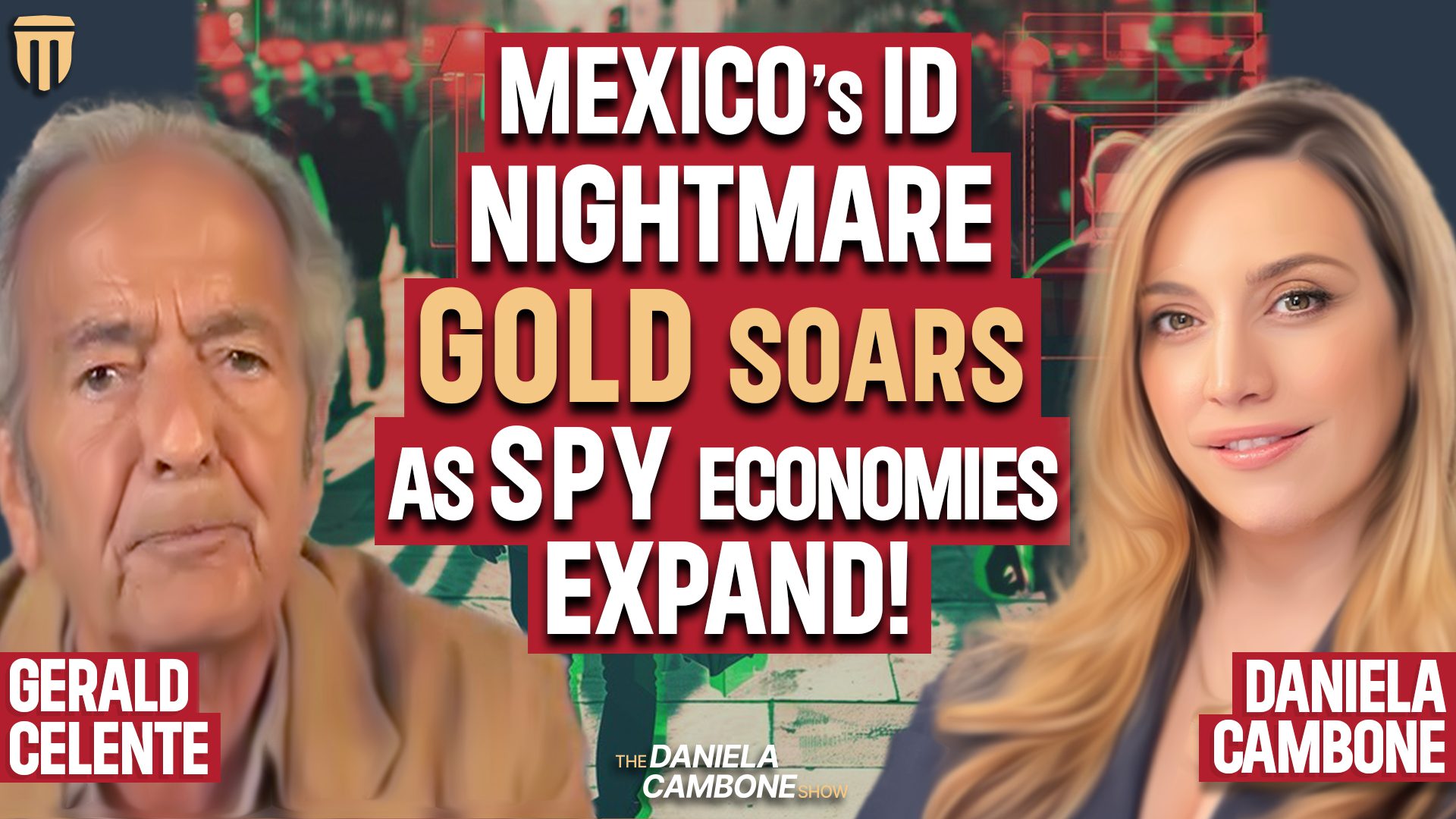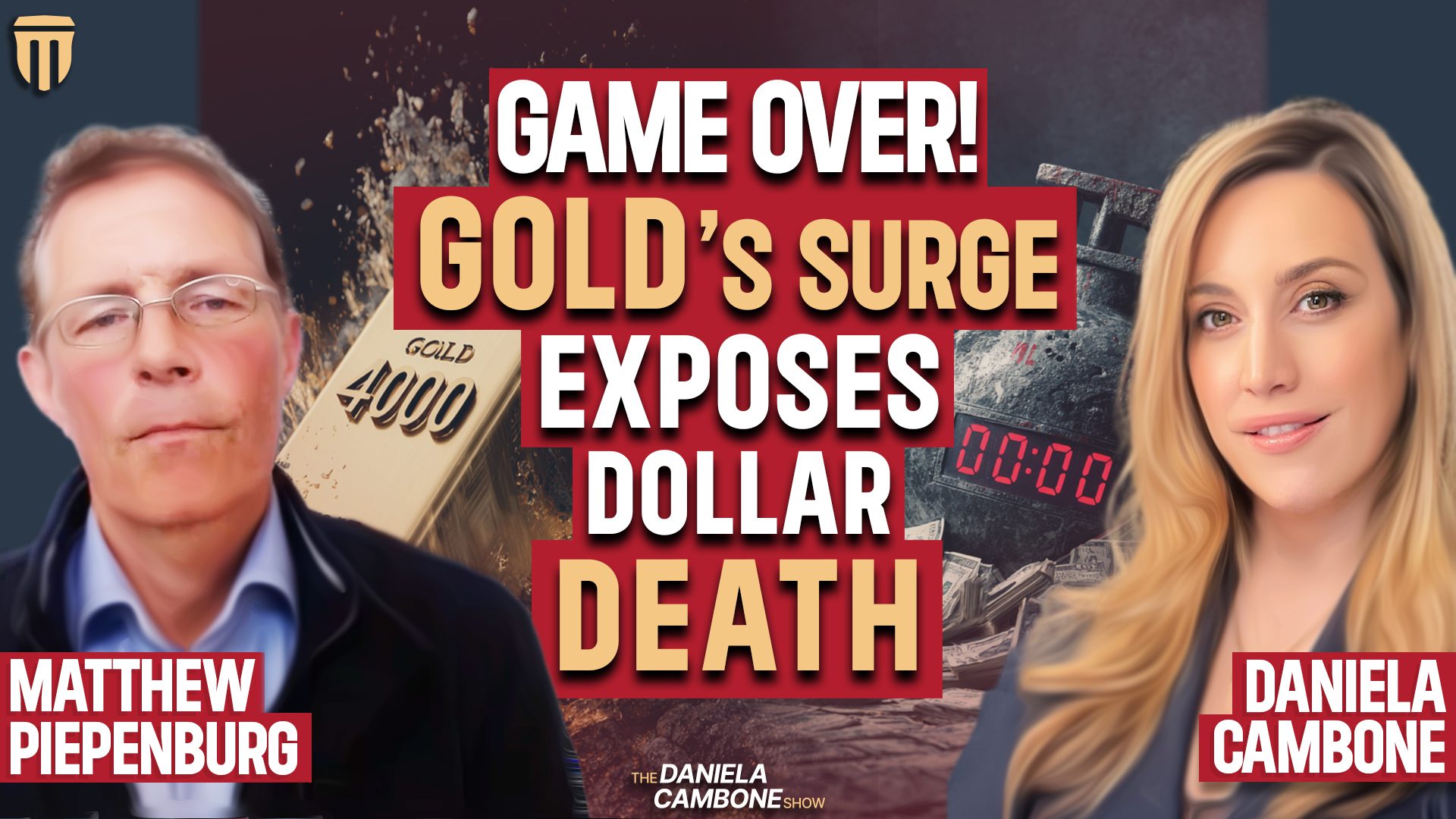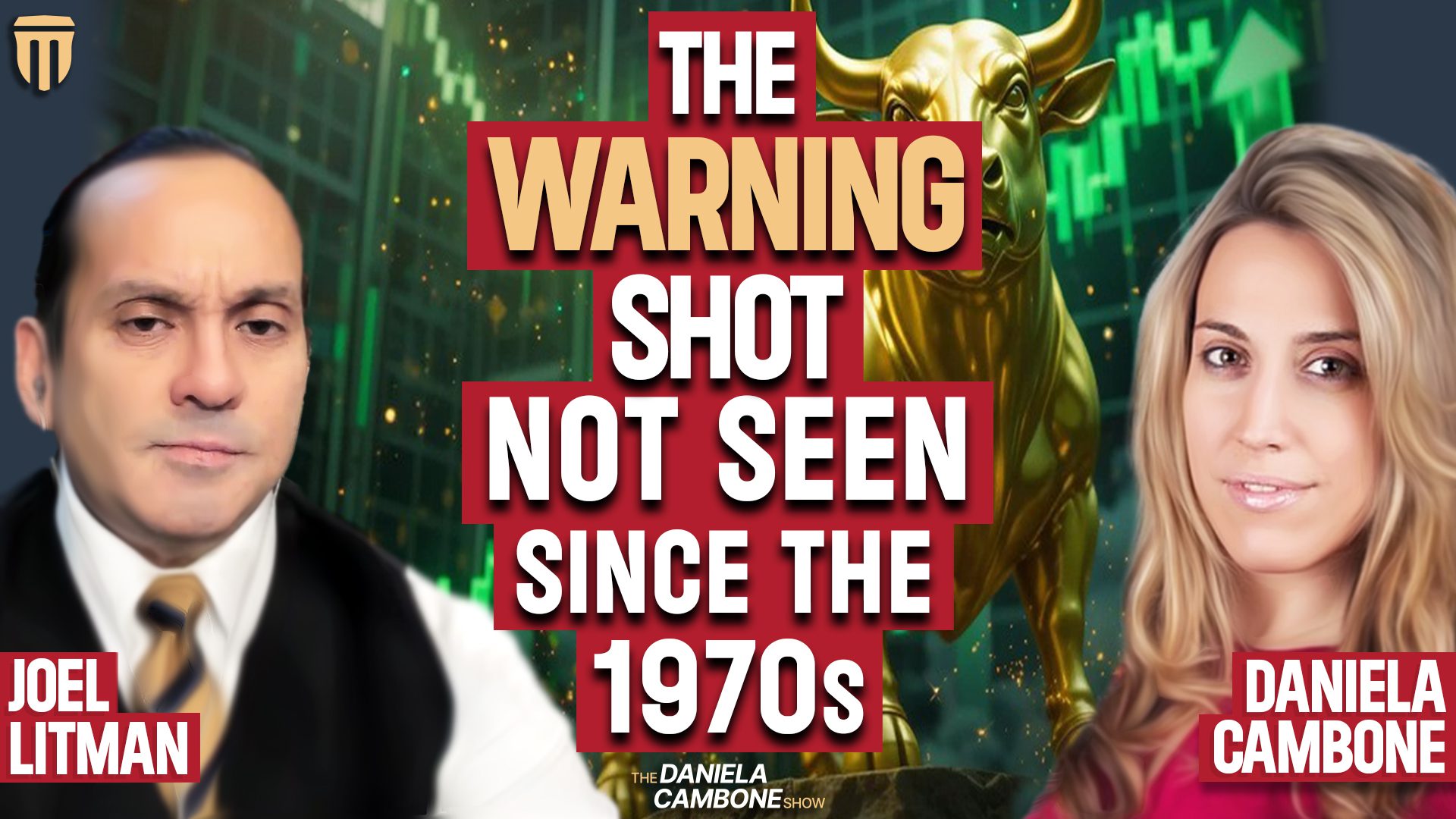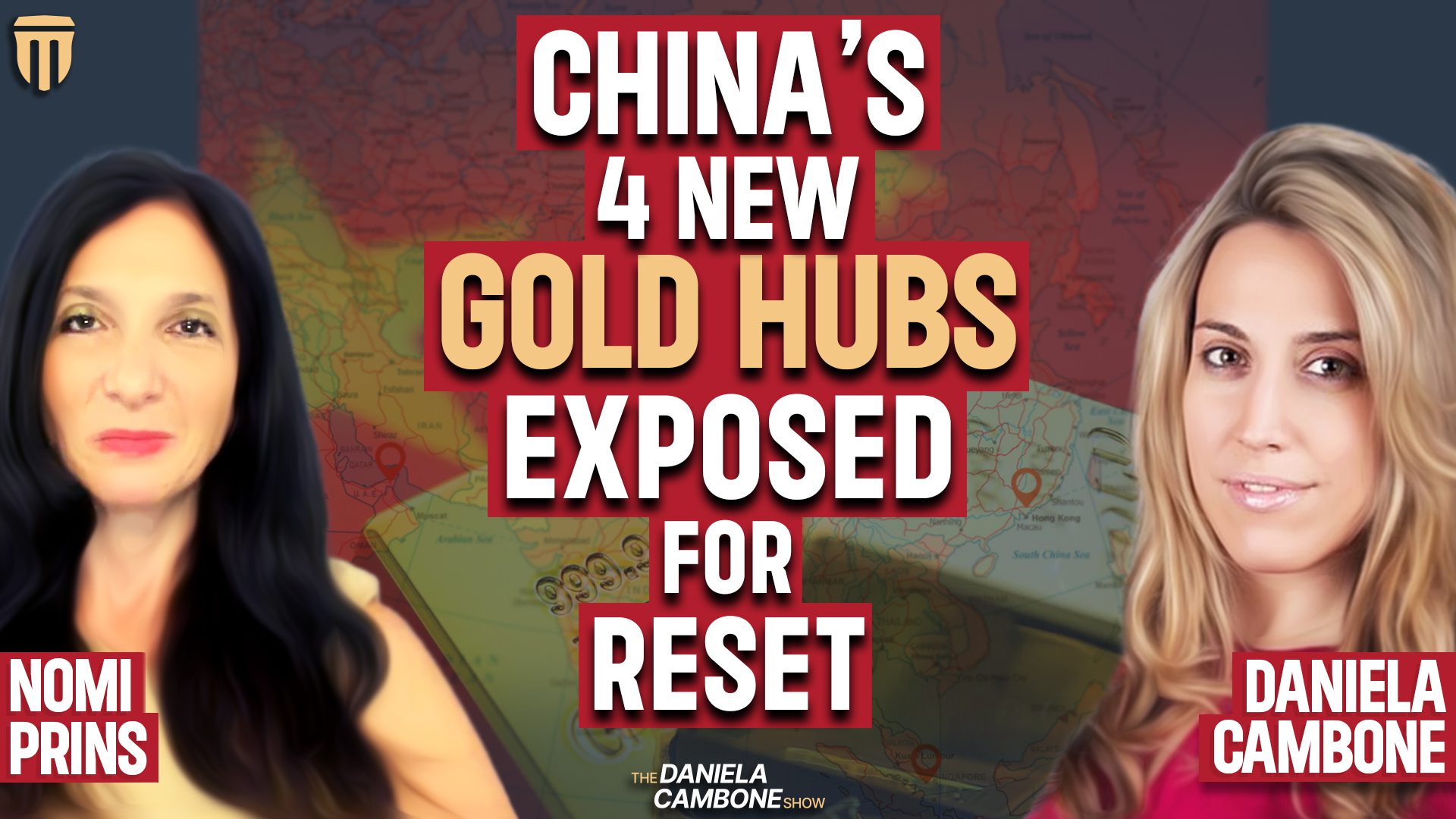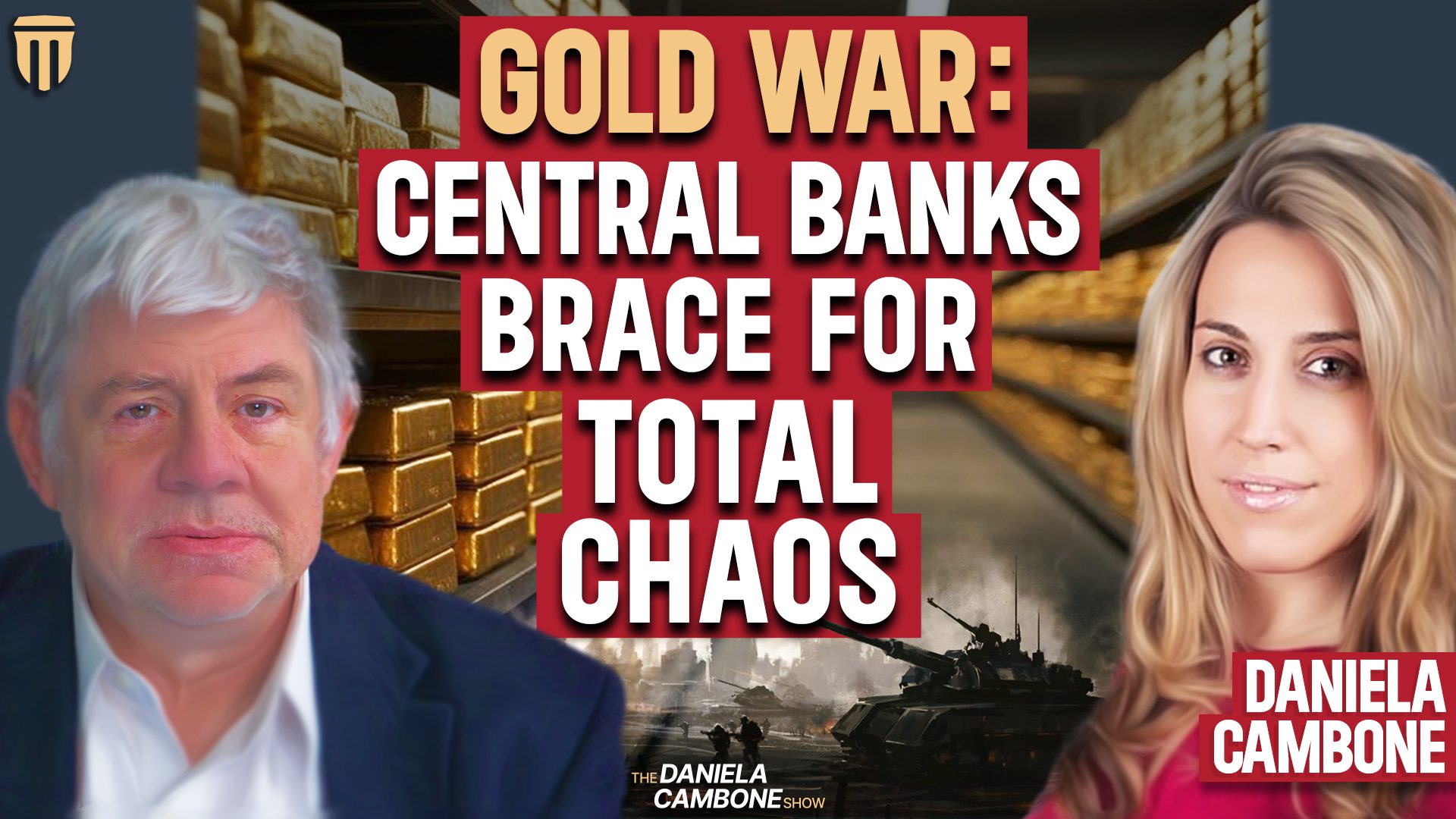“We’re in a Perilous Era” – Billionaire that Forecasted Middle East War, Warns What’s Next
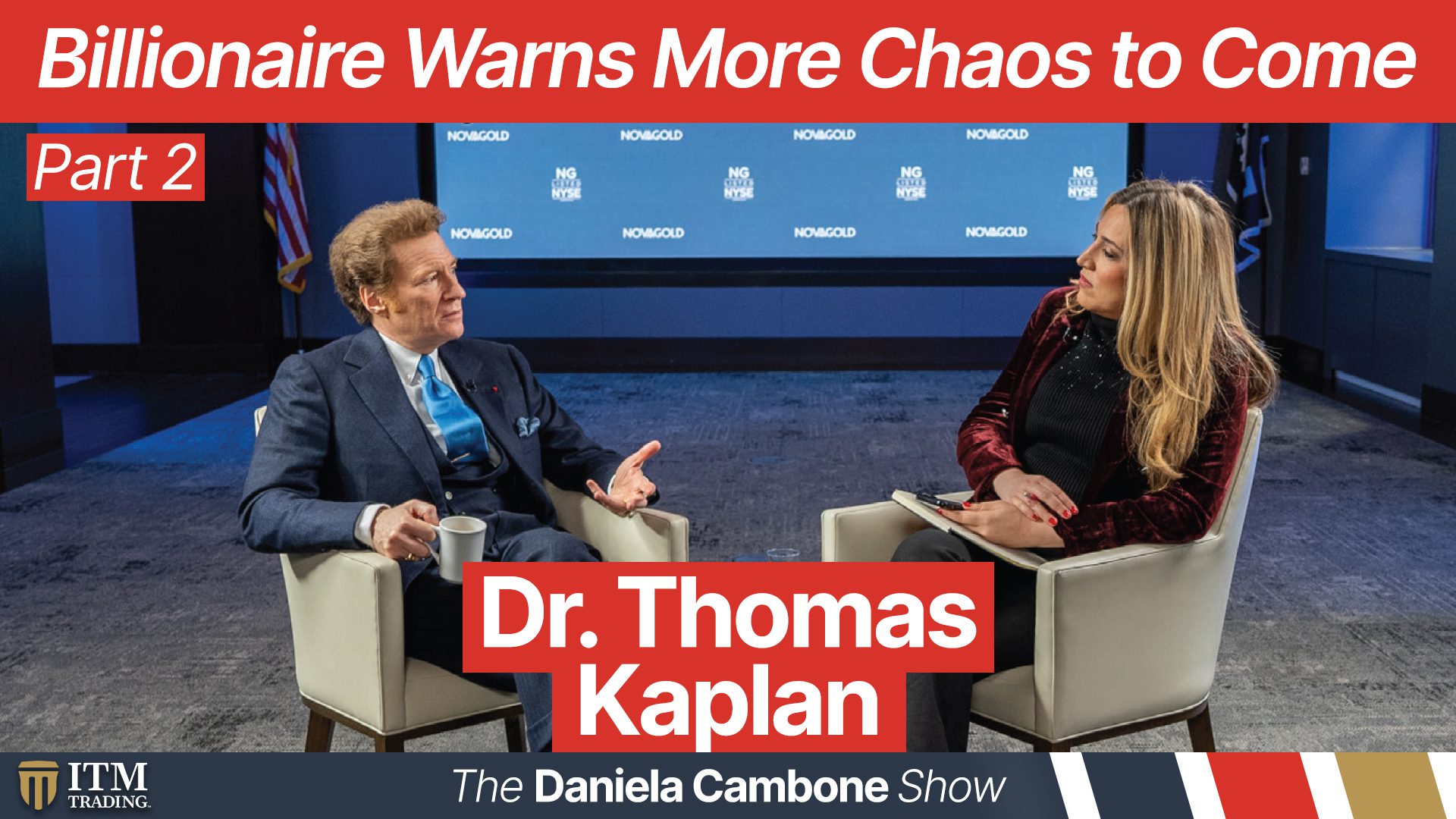
“In the long term, the weaponization may harm the US dollar, because people will rightly look for alternatives, a beneficiary of which is gold,” says Thomas Kaplan in the second part of his interview with Daniela Cambone. Kaplan offers extensive insights into geopolitics, describing the U.S. funding of the Ukraine war as “the best return on investment we’ve had in foreign policy.” “With the Ukrainians, they have fought and won when given the tools, they have shown that they are the implementation of the Reagan doctrine at its purest and at its most ecumenically favorable to the United States,” he adds. Additionally, Kaplan critiques American politicians for their reckless spending practices, stating, “The reality of American politics is that both parties are complicit in their willingness to spend money that we don’t have.”
CHAPTERS:
00:00 A reflection of the past year
19:57 Biden’s foreign policy
27:35 Focusing on issues at home versus abroad
32:44 BRICS undermining the dollar
38:34 U.S. political system
TRANSCRIPT FROM VIDEO:
00:07
Hey, folks, Daniela Cambone here for ITM Trading. We just want to say we had a resounding response to our interview with Dr. Thomas Kaplan, the chairman of NOVAGOLD, where he shared his thoughts on the gold market ahead of gold hitting these all-time highs, that we wanted to share more from that interview. His thoughts on what’s going on in the Middle East, his thoughts on geopolitics. He’s one of the greatest experts and subject matter experts.
00:36
on the topic of geopolitics in the world, that we thought you would find his thoughts here interesting. We hope you enjoy more from this exclusive interview that we held with him, like I said, a few weeks ago at the New York Stock Exchange. Here it is. Hi, this is Daniela Cambone, and it’s really great to be continuing this yearly tradition now of catching up with.
01:00
the man considered the Renaissance man of really the mining industry because of his work in philanthropy, in art, in history, in culture, and of course his long list of accolades in this industry. It’s always an honor to catch up with you. Thomas Kaplan, chairman of Nova Gold. Tom, like I said, it’s really a yearly tradition and I look forward to catching up with you. So nice to be with you back at the New York Stock Exchange. Likewise, Daniella, it’s always a pleasure to see you.
01:29
and indeed to catch up and see what the last year has given us. Well, that’s where I wanted to start. I wanted to pick up from where our conversation wrapped last year. And, you know, it makes me just reflect back and think, look how much changes in a year. During that interview that so many people adored and frankly, were a little frightened, you warned us. And this was exactly one year ago today. You warned us.
01:57
that we were entering the most precarious and critical time since World War II. And of course we spoke before the war in the Middle East. So I wanna pick it up from there. So how do you see things unfolding and what do you make of that soothsayer revelation from a year ago? Did you know?
02:27
what was coming down the pipeline? Unfortunately, yes. And I don’t say that in any self-aggrandizing form. I would much rather be wrong about certain of my forecasts. I would much rather that rather than being self-fulfilling, they are self-denying prophecies. But there are certain areas in which I have a relative advantage of being able to.
02:55
apply an understanding of history and of culture and of the domestic politics of most of the players in the region and of course geography. You know, it’s what General H.R. McMaster put in his book, Battlegrounds. The concept of strategic narcissism versus strategic empathy and not.
03:23
to confuse empathy with sympathy. We’re talking about particularly how to judge and rate and predict the moves of adversaries. And I do think that if you have an understanding that’s grounded in geography, history, domestic politics, you can put yourself in the shoes of those that you’re trying to analyze. And unfortunately, when I do so,
03:52
and I look at what the Chinese call the correlation of forces in the world, there’s no doubt that we are in a very perilous era. And last year, there was enough to my mind to have a foreshadowing of where we would be today. And the truth is that today we are talking about Iran. And…
04:21
In the last 24 hours, Iran has attacked Iraq, Syria, and Pakistan. Missiles have landed in Balochistan. You have, obviously, the war between Hamas and Israel. You have the Houthis in Yemen, who are essentially creating a blockage on
04:46
The Bab-el-Mandeb Straits, through which somewhere between 12 and 15 percent of the world’s trade travels, and is now forced to take alternate routes around Africa. Just when you thought that the issue of supply chains was behind us, you all of a sudden have further signs that the greater geopolitical upheavals are having an impact on the global economy. And…
05:13
This has got to be something that people understand. I’m putting aside its impact on precious metals, just simply because this issue is far too big. It’s far too impactful on our children to try to distill it in terms of, you know, investment or financial implications. So I’d rather discuss it more geopolitically and…
05:41
People can draw their own conclusions about what they want to own to protect themselves in this environment, but I’d rather just put out there the data points and try to connect them. And I appreciate that, and I think it’s crucial to do that, and I think because of your extensive background, I’m curious how you think this will play out, because for most…
06:07
Folks, I would say, in North America, you know, who are not following the news day to day, they just see it happening in that part of the world. It’s not our concern yet, right? But like you said, it’s escalating. The US has just placed the Houthis, or are thinking of placing it on a terrorist watch list. How does this play out for you that, I mean, could it become a world war at this point? Yes. And I hate to say it.
06:37
Trotsky put it very well, and that goes to the heart of our wanting to distance ourselves psychically and even intellectually from the implications of what we’re seeing. It’s a form of cognitive dissonance where we see something, but we’re not really embracing it in terms of engaging with it. Trotsky said, you may not be interested in war.
07:05
but war is interested in you. And we all have to understand that we are in, to use a Kissingerian term, the foothills of a Cold War. And he was referencing the relationship between the United States and China, but it’s now gone beyond that. You have an alignment between China, Russia.
07:35
Iran with some other disenchanted powers such as Turkey and obviously rogue states like North Korea, who have found common cause in trying to create an axis, a more souped up version of what Iran calls the axis of resistance. In Iran’s case, it’s itself.
08:05
and its surrogates, its proxies, Hezbollah in Lebanon, Hamas, Palestinian Islamic Jihad in Gaza and to some extent in the West Bank, Hashd al-Shaabi, Qatayib Hezbollah in Iraq, and of course the Houthis. This is what they call the axis of resistance. The axis of resistance is geared towards the encirclement of Israel.
08:35
the Arab Gulf states. And they’ve been unbelievably successful at being able to get away with it. The world has allowed them to create a sense of plausible deniability by using the proxies. But Iran is as responsible for what’s going on as if it held the gun.
09:04
just segments of it, finally say, basta, no more, we don’t accept this convenient fiction. You are the mothership and you’ve taken the war to us, we’re now taking it back to you. When that happens.
09:26
we can see a very, very quick chain of events, which create vacuums through which the West and also the eastern axis may find itself on opposing sides. So you already have an unprecedented act of aggression taking place in the heart of Europe between Russia and Ukraine, which is supported by…
09:56
China, only to the point that they can help keep the Russians going, but they’ve thus far not passed any red lines with regard to the kind of things that they’re supplying to the Russians. But they’re certainly providing them with a financial backstop. You have the Iranians who’ve stepped in as a major arms supplier of suicide drones and soon ballistic missiles to Russia.
10:25
The relationship that previously existed between Russia and Israel, which was status quo and with some operational overlap in Syria, the Russians now see that differently and the Israelis are starting to see that differently. But at the moment, the focus of the world is on what’s going on since October 7th. And the truth is that…
10:55
This kind of event is one that I did warn against privately to the Israelis and to the Gulf Arabs, and then publicly in two interviews to Haaretz publication in Israel, in which I warned that by not restoring a sense of deterrence, that Iran did not understand what the limits were.
11:24
We were allowing them to engage in reckless behavior. As Lenin said, thrust with a bayonet. If you encounter mush, proceed. If you encounter steel, withdraw. From 2006, when the Israelis allowed Hezbollah to get away with sending missiles into Israeli cities, you’ve had that steady progression, that steady escalation. And you saw it in 2007 in Gaza, 2008 in…
11:52
Lebanon, you saw it with the Iranians fomenting the Houthi advance on the Yemeni capital Sana’a, which then in turn caused the coalition, led by Saudi Arabia and the UAE, to intervene in Yemen. We’re now seeing the chickens come home to roost, where Israel is now fighting Hezbollah in Lebanon, the consequence of which is the tens of thousands of Israelis, well over 100,000 if you include
12:21
those who’ve had to move from the south, have now been displaced within Israel by radical Islamist powers, Shia power in Lebanon, the Hezbollah, and Sunni extremists, Hamas and the Islamic Jihad in Gaza. And now you have the Houthis. And with the Iranians very openly saying that they’re going to use all of their proxies, including…
12:49
attacking American interests and Western interests, not just Israeli, to get their way. So we are in this moment of real inflection where you have the implementation of the Iranian policy, which is what the Germans used to call, ein Kreisungpolitik, ein Kreisung meaning
13:16
encirclement because they were always afraid of a two-front war between France and Russia and Germany sandwiched in between. The Iranians have executed this. They have created…
13:31
the encirclement of Israel and coincidentally, or not coincidentally actually, the encirclement of the Gulf states. So if you were to look at Saudi Arabia, for example, here’s Saudi Arabia, in the northwest, you have Jordan, and I believe that Jordan is the next big agenda item for Hamas and for the Iranians.
13:58
because it has a majority Palestinian population. It’s a real country with recognized borders. And I have been very strenuous in pointing out the risks to Jordan. It’s not enough to just see what’s going on there. It’s imperative that we see it through Iranian eyes, that that’s the missing link. Lebanon, Syria, Jordan, and you have Iraq, and you have that land bridge connecting Tehran with the Mediterranean.
14:27
and you have the Houthis on the Red Sea. So you have this exquisitely implemented strategy, which is in its design and execution as beautiful as any Persian carpet, in which they’ve now achieved ancient agendas of getting to the Med and the Red simultaneously. But if you’re the Saudis, you have that potential Sunni extremists, you have…
14:58
Shia extremists in Iraq on the northern border. If you add Jordan, then you now have that on the Red Sea. This is a problem for the Saudis. Obviously, for the Israelis, who get so much of their trade through the Bab el-Mandeb Straits, it’s existential. When you have an encirclement, you create a race against time.
15:28
Encirclement is all about being able to encircle your enemy, use proxies to create vacuums that then need to be filled, and ultimately to encroach on the enemy’s space and to destroy its morale.
15:49
At a certain point, the encircled power has to make a decision. Do they attempt to break out, or do they in essence stand down and ultimately surrender their freedom of movement, their autonomy, and maybe even their independence? That point in encirclement is the most pregnant that you will find in international relations. And we are there.
16:19
Yes, now it could be this afternoon. It could be a year from now. But the Iranians have played their hand by engaging in suborning and abetting and financing and helping train people to carry out the most barbarous attack.
16:41
in decades, certainly the worst attack on Jews since the Holocaust, worse than anything that we saw coming out of the Islamic State. And I spoke to a previous president of Iraq who said what Hamas did was worse than Daesh, worse than ISIS. So you have this, and you have this loss of empathy and the prospect of what is a just war.
17:09
That’s the bad news. There is good news. But right now, you know, we’re in a season of darkness rather than a season of light. But there is… Well, the good news is that the most revolutionary, in the positive sense, area of the world is in fact emerging out of the Arab Gulf. The reforms that have been undertaken by the UAE.
17:39
by Saudi Arabia are the best sign that if there is going to be an Arab renaissance, a reawakening, a reopening of the Arab world’s mind, we’re watching it being played out. And the impact of that is that they are horrified by the extremism that they see, both Sunni and by Shia. And they want relations with Israel.
18:09
Obviously, the UAE and Bahrain and several other Arab countries established that with the Abraham Accords. Arguably, some of the best signs of philo-Semitism in the world are coming out of the Arab world. When you look at the reforms which have taken place on the religious side, on the economic side, social, cultural, you can look at the Arab world with…
18:37
a sense of encouragement that candidly you find in very, very few places in the world. And whether it comes to increased education, the empowering of women, and a re-embracing of cultural history, you’re finding that in the Arab Gulf. And I’ve often applied that thesis to mining exploration.
19:04
You know, if you’re delusional enough to try to buck 1,000 or 10,000 to one odds, you’ve got to believe in miracles. And the truth is, miracles do happen. They can happen in the Middle East. There are a number of scenarios in which my worst case scenario could be deflected by, for example, Iran taking an off ramp. Right now, you’d have to.
19:33
to, you know, try to fade those odds considerably. But it doesn’t mean that it can’t happen. And I’ve seen stranger things happen in history. And there are grounds for hope. So it is, as Dickens put it, the best of times, the worst of times. That’s where we are. And it is an election year. We see the…
20:01
the free Palestine movements happening all over the world. Hundreds of thousands coming out obviously will be a critical focus point of the election. But I guess my first question to you is, what do you make of Biden’s administrations? What grade would you give Biden on foreign policy?
20:32
pretty high marks for the way that he has dealt with Ukraine and the Gaza war. There’s no question that the support given by Western Europe, mostly economically, and by the United States, mostly militarily, has been crucial in being able to keep Ukraine independent. And the consequences of a…
21:00
disequilibrium of the loss of Ukraine would be devastating on the world economy. All of our assumptions about the price of liberty would be thrown out the window, and it would have very deep psychological as well as arithmetic implications. With the Gaza War, the leaning forward of Biden by sending two aircraft carriers to the Eastern Mediterranean and warning…
21:30
the Iranians publicly and their surrogates, if you’re thinking of taking advantage of this crisis, I have one, two words, depending on how you view a contraction, don’t.
21:49
And that had a huge impact. The Iranians did not expect Biden to lean in in that way. So I give him high marks for being very stalwart. He did two things that Ronald Reagan would have done. Now some will criticize him. I criticize him for what we did in Afghanistan. I don’t think we needed to leave. But…
22:18
He was dealt a hand that was left to him by the previous administration. I think it was politically impossible to be able to survive if Americans were killed in Afghanistan when Trump would be able to say, I was planning on bringing everyone back. These people are dead because of the Biden administration. I don’t think Biden could have survived that. And his instinct was always to withdraw from Afghanistan.
22:45
I don’t think we should have. I think that we could have maintained a very light footprint there because the Afghans were fighting hard for themselves. It’s a myth that the Afghans didn’t fight hard, and the statistics belie that completely. In the previous 18 months, no Americans had died. And from the time that the Western countries, the NATO coalition, handed…
23:15
the military aspect of the war, primarily to the Afghans. The Afghan casualties, which up until 2014, 15, had been 13,000, 14,000. By the end of the war, we’re at 49,000. So you can’t say they didn’t fight. There is pushback from the American population on funding Ukraine. They’re tired of seeing money keep flowing. There’s also pushback on…
23:44
seeing the US dollar weaponized, as many would say. What’s your take? I mean, do you agree that the US dollar is being weaponized? I mean, now there’s talk of, okay, they’re tired of us sending funds, so maybe we’ll seize Russian assets and that’s how we will fund Ukraine. I mean, is it right for America to be involved? And do you agree that the US dollar, do you think it’s being weaponized? It would have been a geopolitical earthquake.
24:11
and disaster for the United States not to involve itself in Ukraine. The Ukrainians are doing the fighting. They’re dying. They ask for aid, military aid and economic aid. It is the best investment that the United States can make to give them what they need to fight the Russians. I’m not saying this because…
24:40
I am a Russophobe. This is Vladimir Putin’s war. It clearly was a tactical as well as strategic miscalculation. When the war began, I was in Europe and the general feeling was that he would make it to Kiev in 72 hours. The fact that the Ukrainians held them off. If you’re a religious person, you’d say it’s…
25:09
It’s biblical. Gog versus Magog or something like this. And the fact that it was, you know, a skinny Jewish comedian who was or is the president of a country, the region of which was considered to be one of the most anti-Semitic in the world a century ago would be astonishing. It would be one of Ben Gurion’s miracles. You just wouldn’t believe it.
25:39
But it’s happened. And the damage that has been done to the Russian military, the degrading of Russian forces, and candidly the unmasking of their corruption and ineptitude, has been one of the few dividends that the United States has had in years. And to pay tens of billions of dollars…
26:08
to have someone else fighting who shares our interests and most of our values against a country which doesn’t and not asking for American troops, but only saying, give us what we need to fight. This should be the essence of
26:37
America’s foreign policy in the sense that it should provide us with a bipartisan logic that Republicans and Democrats should be able to rally around, which is to say, if we have an ally like the Ukrainians, like the Kurds, like the Israelis, who are willing to fight for our interests and to a greater extent than not our values, and they don’t want
27:08
American boys and girls out there, but just give them the tools to do the fighting that is in our mutual interests. That’s a doctrine. That’s something that even in a country as divided as America, Republicans and Democrats should be able to rally around. At least in that area, politics should end at the water’s edge. I think for the, for most people, they’ll say, okay, great. We want to help people.
27:37
look at the country itself. I mean, we’re in New York City, the homelessness, the migrant issue. I mean, that’s what people are seeing is that, and I know that the two should not be blended, help for Ukraine versus, you know, what’s happening back at home, but that’s what people see. And from the politicians, they want them to first fix America. Yeah, but you know something that’s demagoguery. The reality is that what we’re giving to Ukraine is barely a rounding error.
28:07
We’re a country that is tens of trillions of dollars in debt. America hasn’t shown fiscal discipline. We haven’t had a balanced budget at the federal level since the Clinton administration. The Republicans and the Democrats are united on only one thing, and that is their willingness to spend money that they haven’t been able to balance on the other side of the ledger. This is the great…
28:37
reality of American politics, which is that both parties are complicit in being willing to spend money that we don’t have. When people are talking about budget cuts, so we have to think of America first, it’s complete demagoguery. The investment in Ukraine is the—
29:03
best return on investment we’ve had in foreign policy in decades. We probably invested a trillion dollars in Iraq and in Afghanistan, maybe much more than that, for which we have no return on investment. With the Ukrainians, they have fought and won.
29:32
when given the tools, they have shown that they are the implementation of really the Reagan doctrine at its purest and at its most ecumenically favorable to the United States. And so don’t say that 10, 20, 30, 40, $50 billion, it doesn’t mean anything anymore. And anyone who says that it does knows that they’re lying to the American people.
30:01
You know, I grew up as a Reagan Republican. And this is something that I have no doubt Ronald Reagan would have embraced. There isn’t a chance in the world that he would have denied Ukraine money. And candidly, the fact that it’s Republicans who are pushing back in Congress and making these demagogic representations, we have to focus on our country first. And yet…
30:30
continuing to call for tax cuts that the rich do not need. Trust me. It’s nonsense. It’s actually insulting. Let’s get to the second part of that question. I’m getting to gold. I’m getting to gold, people. But the weaponization or do you think it’s being weaponized? And do you think that the US dollar is in a fragile state?
30:59
There’s no question it’s being weaponized. The only issue is from a cost benefit analysis, is that the right thing for the United States to do? And the reality is that it is one of the great legs of economic power that we have in the world, that the dollar is
31:30
preponderant in terms of the world’s currencies. It should probably be 15% of reserves, 20% maybe, not 60. This is a distortion. There are reasons for the distortion because whereas I do believe that over time, the dollar will erode in terms of that preponderance.
31:57
and become more reflective of the real situation of trade, there are conditions which are very favorable to the dollar. Until the Chinese have a totally freely converting currency, the dollar provides liquidity. But over time, there’s no doubt that the Chinese with their partners will try to undermine the dollar.
32:27
The BRIC, are you talking the BRICS with our partners? Sure, absolutely. Let’s talk that, let’s go there. Whether they succeed or not is the question. Ultimately, I think that inertia will take it forward in that process, but there are things that could accelerate it. I said at the start, how much a year can change and last year we were talking about the BRICS and I think Saudi Arabia had just changed and here we are one year later, five new nations added. And before…
32:55
You know, we used to just say, like, these are like a bunch of misfits at the table, you know? No one really wants to sit with them yet. No one’s really taking them seriously yet. Oh, they’re just a bunch of talk. They’re just talking to bricks. But they keep growing. They keep growing in power. And the common denominator there is the power they have in energy. Do you think the bricks, is it right to discount the bricks, or do you think that they are going to be a force to be reckoned with?
33:26
Ultimately, they’re a force to be reckoned with. I’m not saying that they deserve or merit the power, but you are talking about the vast majority of mankind being subsumed in those populations. And the truth is that for everything that I said about America’s interests with Ukraine,
33:53
Governments representing the vast majority of the world are either tilted towards Russia or ambivalent at best. That’s besides the point. For Europe and the United States, Ukraine staying independent is existential. One of the reasons is the interlinkage between currencies and energy.
34:23
and geopolitical power, military power. The damage to the prestige of the United States by a loss of a country such as Ukraine to the Russian autocracy or the loss of Israel to the axis of resistance would have
34:51
a tremendously negative impact on America’s economy in the long term. Because if we accept that the US dollar is a fundamental pillar of American economic hegemony, that’s what makes it a lightning rod for the Chinese, the Russians, and South Africa, Brazil, et cetera. But if we accept that, then you have to ask yourself, what do we need to do?
35:19
in order to maintain it. And that’s where the question of the weaponization comes in on a cost benefit analysis. In the long term, the weaponization may harm the US dollar, because people will rightly look for alternatives, a beneficiary of which is gold. But as John Maynard Keynes said, in the long term, we’re dead. So we are dealing with existential.
35:49
political military crises right now. And there’s no doubt that the weaponization of the dollar, particularly with regard to Russia, has had an impact. And I think it’s one of those things where, like the way that we bailed out the world in 2008, 2009, what are the long term implications of throwing the whole chessboard?
36:16
of fiscal and monetary restraint out the window. We don’t know yet. But what we do know is that had that intervention not taken place, the plumbing of the global financial system would have been stuck, and we would have gone into a depression. So people will argue, and historians go in cycles over these things, what was right, what was wrong. They’ll argue about it. But the fact is that you have to ask yourself, what’s the cost?
36:45
of taking an action that in the long term, one isn’t sure of the consequences versus the near term exigencies of actually dealing with a crisis in the here and now. So the dollar has been weaponized. It has had an effect. It has had a positive effect with regard to the Ukrainian story.
37:14
It may have accelerated a desire by BRICS to seek an alternative, but there are ways for the United States to mitigate that. For example, Saudi Arabia, there have been lots of rumors that the Saudis will move away from the dollar as being the only way to value oil. On the other hand, there have been very serious discussions, which are public.
37:42
of the United States providing a security guarantee to Saudi Arabia. For sure, one of the quids pro quo will be that the Saudis stick with the dollar. Big deal. So it’s the United States has cards to play. And by the way, that’s certainly an instance where I think we should play that card, because it would be very powerful if the United States could keep Saudi Arabia within its orbit, and in fact, the whole Arab Gulf.
38:13
This is what’s called crisis management. It’s what’s called in financial world, lingo, fast moving market conditions. Sometimes you’re not sure what to do, like what Hank Paulson did in 08, 09, but you know you have to do something because the alternative is collapse. And… Will the US always have those cards to play? I mean, people will say, well, all empires will eventually fail. At one point, do all the playing cards go away?
38:43
Sure. There is nothing sacred about the American political system. There was a great judge, probably the greatest jurist who didn’t become a member of the Supreme Court, Learned Hand, who said, liberty lies in the hearts of men and women. If it dies there, no law, no court, no constitution can preserve it.
39:13
For want of a better world, liberal democracy, small l, this has nothing to do with Democrats or Republicans. Liberal democracy, and as a place where the rule of law is sacred, if they lose faith in that in the United States, you could have a dollar crisis. And your viewers out there would be shocked at, you know, how quickly wealth can evaporate.
39:42
Because as George Soros put it, of all the investment decisions which one has to make, the most important decision is the choice of which currency in which one will be denominated. For me, that currency is gold.
40:01
Thank you all for watching. We hope you enjoyed more of that exclusive interview with Dr. Thomas Kaplan. As always, I invite you all to sign up at danielacambone.com so you can stay on top of all these exclusive interviews. Thanks for watching.
